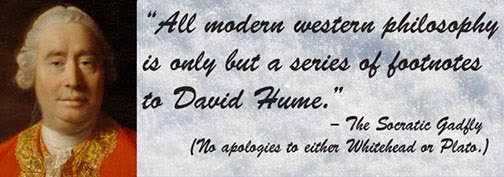Note: This is reblogged from my primary blog.
Massimo Pigliucci has another interesting, somewhat thought-provoking, guest column at Scientia Salon. (Seeing as I'm the only person who has submitted anything directly connected to aesthetics there, although Massimo's defense of the humanities is somewhat connected, I need to finish up work on my own follow-up piece.)
Speaking of follow-ups, in his first piece, Mark English decried philosophy for, among other things, being "parasitic" on religion. He used that exact word after I, among others, challenged his original claim that philosophy was too dependent on religion. Unfortunately, I didn't do a follow-up to his response, noting that the likes of Hume were writing about religion-based metaphysics specifically in order to purge it from philosophy.
Well, in his current piece, English claims that philosophy is defined too broadly.
It's not a flat-out paean to scientism, but could certainly be seen as broadly supportive of that attempt at greedy reductionism, to claim that everything is reducible to the natural sciences. (Or, if you're more greedy yet, I suppose one could propose #mathematicism, the idea that everything is reducible to mathematical formulae, the more of them that are a priori, the better.) Given that the title of his first piece was, "Does Philosophy Have a Future," I don't think it's at all unfair to say that English has one foot, at least, in the scientism camp.
But, let's get beyond that.
In the current piece, among other things, English says philosophy is "thinking about thinking."
To me, the issue, if we're getting into definitions, maybe Mark is defining philosophy too narrowly, even while lamenting it operates too broadly.. First, is political science philosophy? Arguably yes. Second, under the "thinking about thinking," the "philosophy of X" idea has room to grow.
Related to that, is "thinking about thinking" the best way to describe philosophy? I think not. If, like me, people accept at least some validity to the idea of "subselves" and the idea of consciousness not being fully unitary, and related issues, along with accepting the idea that we're just not quite so rational as we might want to believe about ourselves, calling philosophy "thinking about ***," let alone "thinking about thinking," is probably too limiting.
In short, to counter Mark, who thinks philosophy is too broad, I'd say it's too narrow. I'll add, per the "political science" issue, that Kung Fu Tzu, for example, arguably philosophized about politics more than anything else. So did Hobbes. And, I bring Master Kung into the issue to note that English has limited himself to Western philosophy only.
Wittgenstein gets brought into the discussion there, too. To the degree language is limited, and philosophy of language has made limited investigation of non-verbal communication, and its emotional content vs its rational thinking content, this is all the more reason to state that philosophy is probably too narrowly defined in too many people's minds.
This is a slice of my philosophical, lay scientific, musical, religious skepticism, and poetic musings. (All poems are my own.) The science and philosophy side meet in my study of cognitive philosophy; Dan Dennett was the first serious influence on me, but I've moved beyond him. The poems are somewhat related, as many are on philosophical or psychological themes. That includes existentialism and questions of selfhood, death, and more. Nature and other poems will also show up here on occasion.
Sunday, September 07, 2014
Friday, September 05, 2014
A Mahler 6 I LIKE!
It is HARD to find a good Mahler Sixth; most conductors play
the first movement too slow. Abramavel arguably plays the first theme lines too
fast and doesn't let it breathe. Boulez isn't bad, but he can be hit and miss.
Well, just found this. So far, it sounds good. Good "breath,"
good phrasing and more.
Beyond that, it's well miked and well recorded overall. There's good sound separation here.
Beyond that, it's well miked and well recorded overall. There's good sound separation here.
I'm going to have to look for other stuff by Ivan Fischer.
This New Yorker profile is a great look at his musical idea-making and more.
Here's another great sample — just one movement, but the third movement, the "Frere Jacques," of the First Symphony. It's got so much suppleness, yet dynamism:
I'm ready to pitch all of my Boulez and assorted other Mahler conductors.
And, not pitch them for Fischer, but for Kirill Kondrashin. Having discovered his Mahler after his "accept no substitutes" Shostaskovich, this Sixth, while seeming a bit rushed in the opening, is definitely better than Fischer's:
This New Yorker profile is a great look at his musical idea-making and more.
Here's another great sample — just one movement, but the third movement, the "Frere Jacques," of the First Symphony. It's got so much suppleness, yet dynamism:
I'm ready to pitch all of my Boulez and assorted other Mahler conductors.
And, not pitch them for Fischer, but for Kirill Kondrashin. Having discovered his Mahler after his "accept no substitutes" Shostaskovich, this Sixth, while seeming a bit rushed in the opening, is definitely better than Fischer's:
Subscribe to:
Posts (Atom)
